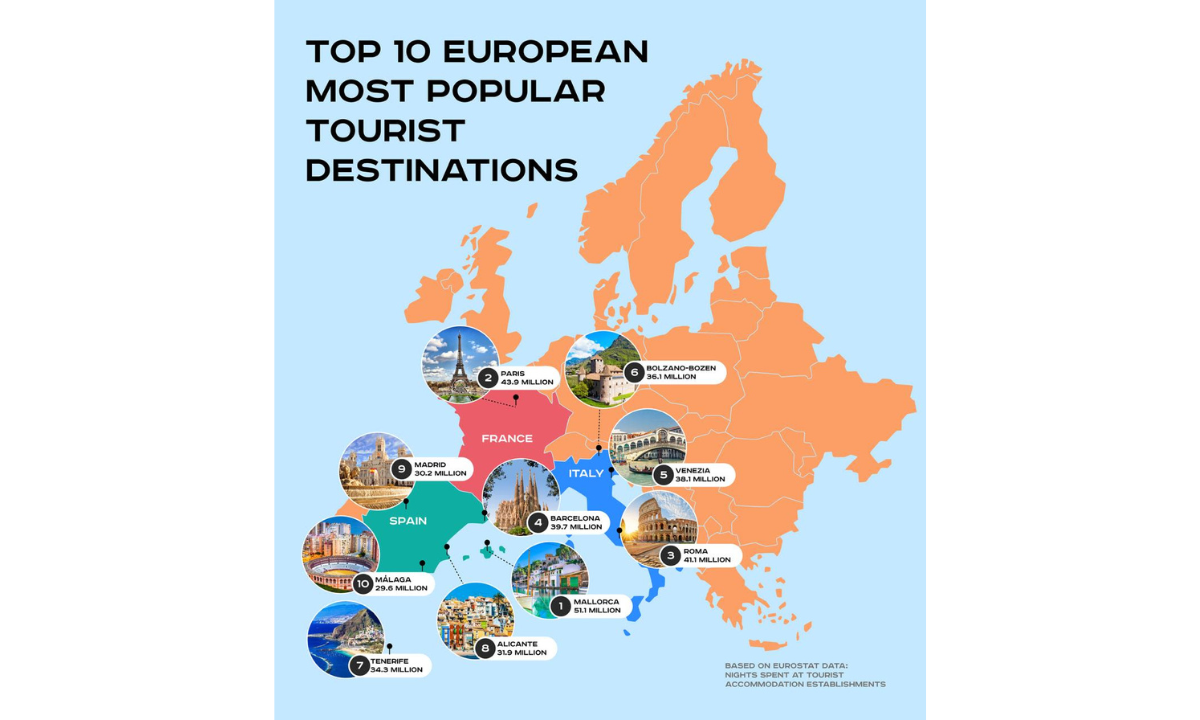
Riga, Latvia - May 16th, 2025 - Qwoted Newswire - Europe is expected to hit another overtourism peak this summer. According to Eurostat, Europe welcomed a staggering 3.05 billion tourists in recent years, nearly triple its population of 473.7 million. This includes 1.3 billion international visitors, with one-third arriving from within Europe itself.
Here's the top 10 most popular European destinations:
1. Spain - Mallorca (51.1 million)
2. France - Paris (43.9 million)
3. Italy - Roma (41.1 million)
4. Spain - Barcelona (39.7 million)
5. Italy - Venice (38.1 million)
6. Italy - Bolzano-Bozen (36.1 million)
7. Spain - Tenerife (34.3 million)
8. Spain - Alicante/Alacant (31.9 million)
9. Spain - Madrid (30.2 million)
10. Spain - Málaga (29.6 million)
Spain dominates the list of Europe’s most visited destinations. The data shows that 7 of the top 10 most visited cities in Europe are Spanish, led by Mallorca with 51.1 million hotel nights booked, followed closely by Barcelona, Tenerife, Alicante, Madrid, and Málaga. France and Italy also remain among the top destinations, with Paris and Rome listed as two of the most visited cities.
Unsurprisingly, the tourism boom makes locals feel no longer at home, despite the positive effect that tourists have on the economy.
Spain: A Victim of Its Own Success
While tourism has significantly boosted Spain’s economy, it has also revealed a troubling imbalance. Of the 17 Spanish regions, 12 are almost entirely overlooked, while 5 account for nearly 80% of all tourist stays:
-
Canary Islands,
-
Catalonia,
-
Andalusia,
-
Balearic Islands, and
-
Valencian Community
This uneven distribution is largely due to marketing efforts by the government and travel companies that consistently promote well-known hotspots. The result: Spain receives 8.3 million tourists per destination on average, compared to France’s 4.4 million and Italy’s 4.2 million.
Italy and France: A More Balanced Approach
Italy has done a better job of spreading the tourist load across 9 regions, from Veneto and Tuscany to Campania and Sicily. France falls somewhere in between, with the majority of its visitors concentrated in 7 major regions, including Île-de-France, Provence-Alpes-Côte d’Azur, and Nouvelle-Aquitaine.
In contrast to Spain, France and Italy have adopted a strategic, data-driven approach. Their governments are collaborating with travel influencers to promote lesser-known regions, optimizing tourism marketing for off-peak seasons, and keeping tourism flows more evenly spread across various regions.
Hidden European Gems: Cyprus, Malta, Bulgaria and Portugal
Overtourism is no longer just a buzzword you see in media outlets. Traveling to overcrowded destinations can turn your vacation into a nightmare rather than a lovely getaway. Among the destinations that offer nice weather and beautiful beaches, yet are often overlooked by travelers, are:
-
Portugal - 82.9 million
-
Bulgaria - 27.7 million
-
Cyprus - 15.6 million
-
Malta - 9.8 million
Finally, even Spain offers far less crowded locations that you can take advantage of. For instance, both Cantabria and Murcia are the 16th least popular compared to the Canary Islands and can serve as great alternatives.
Please feel free to reach out if you're looking for any other datasets or trends; we'd be more than happy to assist in providing them.
You can find the additional information via this link: https://www.discovercars.com/blog/overtourisim-in-europe
About
Media Contact
